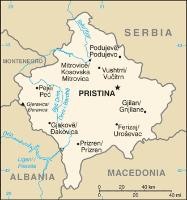MITROVICA, Kosovo -- At first glance, Mitrovica looks like an unremarkable post-industrial mining town. A cloud of smoke hovers over a sprawl of dusty roads dotted with Yugoslav-era apartment blocks and an unattractive monument to local zinc miners, both Serb and Albanian, who battled against the Nazis during World War II. Today, the city is divided by a river and a bridge, symbols of the ethnic strife that exploded in violence in 1999 and again in 2004, driving Mitrovica's Albanians to the south, and Serbs to the north, of the Ibar River. The final scheduled talks between Kosovo and Serbia ahead of a Dec. 10 U.N. deadline for determining Kosovo's status broke down this week. But Kosovo leaders, including current Prime Minister Agim Ceku and his likely successor, Hashim Thaci, both former rebel fighters, say they are determined to declare independence with or without Serbia's agreement. If that happens, observers fear that Kosovo's 120,000-strong Serb minority (about 7 percent of Kosovo's population), which boycotted the breakaway province's parliamentary elections earlier this month, may attempt to secede. Is it possible to bridge Kosovo's ethnic divide?
Kosovo’s Divided City of Mitrovica Warily Awaits Independence

